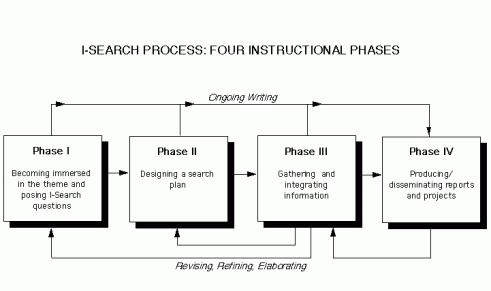You’ve made your pitch and you are thinking about the next action steps you need to take to formalize your plan. Parallel to this work, you are asked to do a deep dive into the issues and ideas connected to your essential question. This phase will ask you to explore what is already known, understood and debated as it relates to your essential question. What’s already been written that you can read? Who are individuals that are engaged in this work with whom you might speak? How can you build a foundation that grounded in the work that has already been done and is being done by others related to your essential question? How might you bring an understanding of this work with you as a guide/support when you begin the experimental portion of the project? What ideas will you seek to validate through your experience? What ideas do you hope to challenge?
To do this, you’ll need to engage in a personally relevant research project called the “I-Search.”
The following outline is adapted from https://www.gallaudet.edu/tutorial-and-instructional-programs/english-center/citations-and-references/i-search-paper-format-guide
An I-Search paper is a personal research paper about a topic that is important to the writer. An I-Search paper is usually less formal than a traditional research paper; it tells the story of the writer’s personal search for information, as well as what the writer learned about the topic. You’ll tell the story of your I-Search through a series of posts on this website. It will serve as the introduction to your project documentation.
The Search Story sequence of posts:
- Explain what you already know about your essential question. Why is it important for you to find out more about this question. What understandings and experiences are you bringing with you as you start this research process? Explain why the topic is important to you, and what is motivating your inquiry.
- Tell what you want to know about your essential question? What are the areas of inquiry that you think need to be explored? What are the other questions that are lurking just beneath the surface of your guiding essential question?
- Who and what will you seek out as sources to help you answer your questions? At a minimum, you need to identify (1) long-form non-fiction or fiction book related to your question that you will read and write about, (1) person doing work in a field related to your question who you will interview, and (3) other sources, which might include a journal article, long-form news article, podcast, website. Here are some resources that you might find useful in conducting interviews:Empathy Field Guide
Interview for Empathy
Interview Discussion Guide Worksheet - Your investigation of each of these sources should produce a related post that synthesizes your findings and explores your deepening understanding of the issues and ideas connected to your essential question. These posts should describe the findings of your research and you should support your findings with quotations, paraphrases, and summaries of information from sources.
- Explore any insights related to the research process itself? What was easy? Hard? Surprising?
- Reflect on your search. Describe what you learned and how your research experience might have changed you and your future. What new ideas and questions will you be taking with you into the experimental portion of your project? What new avenues for exploration do you hope to explore as a result of taking this deep dive?

You can find more information about the I-Search paper here: